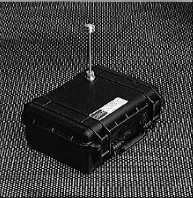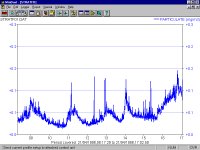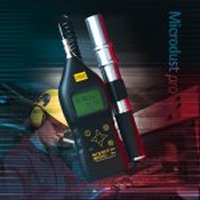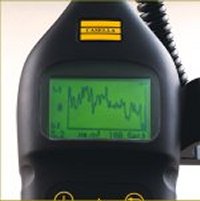Applications
·
Real-time measurement
of airborne particulate concentration
·
IAQ Monitoring
·
Industrial Hygiene
factory monitoring for particulates
·
"Walk
through" surveys
·
Specialist size
selective monitoring (PM2.5 and PM10, respirable and thoracic)
·
Filter test and
aerosol research
Features
·
Affordably priced
·
Hand held and
portable
·
Wide range (1
microgram/m3 to 2500 mg/m3)
·
Internal data logger
·
Graphical on-screen
display
·
Versatile software
included
·
Built-in calibration
for zero and span
·
Option of user
defined calibration
·
Option of
rechargeable (10 hr) or alkaline (20 hr) batteries
·
Size specific inlets
(TSP, PM10, PM2.5 and respirable)
The Microdust ProTM is the latest development in the science of
photometric measurement of suspended particulate concentrations. While
instruments of this type have been available since the 1960's, this latest
development from Casella Ltd. of Bedford, U.K. represents a step-function
advance over all competitive offerings.
Operation
The Microdust ProTM measures particulate concentrations using a
near forward angle light scattering technique. Infrared light of 880 nm
wavelength is projected through the sampling volume where contact with
particles causes the light to scatter. The amount of scatter is proportional
to the mass concentration and is measured by the photo detector. By using a
narrow angle of scatter (12-20 degrees) the majority of light scattered is in
the diffracted and refracted components, which minimizes the uncertainty
associated with particle color, shape, and refractive index.
Concentration Range
The Microdust ProTM has the advantage that there is only one model
which covers the entire measurement range (0 to 2500 mg/m3). It is possible
to "fix" the range of the instrument, or have it as an
"auto-ranging" device.

|
|
Display
The Microdust ProTM incorporates a 128 x 64 pixel graphical
backlit display. Dust concentrations are presented in two unique ways:
·
Graphical
representation - the Microdust Pro is the first real time particle measuring
instrument to have a scrolling graph of dust concentrations. The graph is
able to show a continuous trace over a number of time-bases. These may be set
on the X-axis at 100 seconds, 200 seconds, 15 minutes and 1 hour. The Y-axis
range may be auto-ranging or fixed.
·
Numerical values -
instantaneous concentrations are displayed, as well as values for the Time
Weighted Average (TWA) and maximum concentrations. These values can be reset
at any time by a "one button" reset.
Calibration
Each Microdust ProTM is individually factory calibrated using a
gravimetric technique. The instrument can be returned to the 'factory'
calibration setting, at any time during its life, by the use of a non
degradable calibration insert (supplied).
An individual gravimetric calibration is also possible. This involves the
collection of a gravimetric (filtered) sample of the dust after it has passed
through the probe optics. In this way, two averages are collected over the
exposure period. One is from the filter, whilst the other is provided by the
averaging function within the instrument. It is then possible to derive the
difference in these two figures and correct accordingly.
Additionally, it is possible to store 4 different calibration values within
the instrument and select these according to the situation. All these
procedures are accessible through the easy menu structure.
Software
The WinDustProTM software offers the user the ability to perform
the following functions:
·
Create a
"profile" for the instrument (logging interval, parameters and
"identifier" for multiple instruments). Transfers control profile
from the PC to the instrument.
·
Recover data from the
instrument
·
Production of line
graphs based upon historical data
·
Tabular and report
presentation of data files
·
Real time
presentation of prevailing conditions via the RS232 connection

Data-logging
The Microdust ProTM features an internal logger which can store up
to 15,700 data points over 32 separate runs. The logging interval can be set
from 2 seconds to 10 minutes. At 2 seconds, it is possible to record 8.75
hours of data; at 5 minutes,
this equates to a total logging time of 50 days. Recorded values include:
·
Average concentration
over the logging period (mg/m3)
·
Maximum concentration
over the logging period (mg/m3)
·
Date and time stamp
Operation:
|
Sensing Technique
|
Near forward light scattering -
880 nm infrared
|
|
Ranges
|
All instruments provide 0 to
2500 mg/m3 over four ranges as standard
|
|
Resolution
|
0.001 mg/m3 (1 ug/m3)
|
|
Operating temp range
|
0 to 50 C (non condensing)
|
|
Storage temp range
|
-20 to +55 C
|
|
Calibration
|
Gravimetric method using
'Arizona Fine' calibration dust (ISO12103-1,A2)
|
|
Zero stability
|
+/- 0.002 mg/m3/C
|
|
Span stability
|
< 0.7% FSD/C
|
Power:
|
Battery
|
4 x AA / MN1500 cells -
Alkaline or rechargeable NiCd
|
|
Operating duration
|
Alkaline (2700mAh) typ. > 20
hrs
NiCd cells (950mAh) typ. > 10 hrs
|
|
Battery charging
|
Internal NiCd fast charger
circuitry (with time-out protection)
|
|
Charge rate
|
Fast charge rate 450mA, Standby
charge rate 55mA
|
|
Power adapter
|
Universal input voltage range
100-250VAC, 47-63Hz
|
|
Output
|
12VDC @ 0.8A
|
General:
|
Analogue Output
|
0 to 2.5Vdc FSD, 500 ohm output
impedance (3 ms update rate)
|
|
Keypad
|
7 key tactile membrane
|
|
Weight
|
Instrument only: 0.97 kg (2
lbs) (complete kit with flight case: 4.5 kg (10 lbs))
|
|
Dimensions
|
Probe: 35 mm dia x 290 mm (1.4
x 11.4 in) total length
Instrument H x W x D: 245 x 95 x 50 mm (9.6 x 3.7 x 2 in.)
Flight case H x W x D: 135 x 490 x 370 mm (5.3 x 19 x 14.5 in)
|
|
Maintenance
|
Factory cleaning required
annually depending on measurement conditions
|
Display:
|
Display
|
128 x 64 pixel LCD graphics
panel with backlight
|
|
Displayed values:
|
|
|
Instantaneous reading:
|
Rolling average concentration
over a user selectable period (1 to 60 seconds)
|
|
Time weighted average:
|
Average concentration since
power on or reset
|
|
Maximum value:
|
Maximum concentration since
power on or reset
|
|
Scrolling graphs
|
100/200 seconds, 15 minutes or
60 minutes (Y axis autoranging or fixed)
|
|
Battery voltage
|
Battery voltage with 'OK'/'Low'
status message
|
Calibration:
|
Factory calibration
|
Traceable isokinetic technique
(wind tunnel) and ISO 12103-1
|
|
User calibration
|
Four user defined calibration
settings available
|
|
Routine calibration
|
Software calibration for zero
and span setting
Optical calibration filter supplied (restores factory calibration)
|
Data Logging:
|
Internal memory
|
64K EEPROM providing 15,700
data points
|
|
Logging interval
|
Adjustable from 2 to 600
seconds
|
|
Recorded values
|
Average concentration over
logging period
Individual, average and max/min concentrations over logging period
|
|
Serial interface
|
RS232 up to 38.4K baud
|
Software:
|
WinDustPro provides a friendly graphical interface for
instrument configuration, data download and graphical report presentation
|
|
Operating system
|
MicrosoftTM Windows 95, 98 or
NT (16 or 32 bit)
|
|
Requirements
|
IBM compatible PC with RS232
serial port, 8MB RAM, FDD, HDD, VGA colour graphics
|
|
|
Microdust
Environmental Enclosure
The Microdust Environmental Enclosure accessory to the Microdust Pro is
designed to monitor aerosol or dust concentrations in either indoor environments
where security is an issue, or in ambient conditions. Using the enclosure, it
is possible to monitor a range of particle sizes (including PM10, PM2.5,
respirable or TSP) for up to 24 hours. A filter collects all the sampled dust
for gravimetric or chemical analysis and a "retrospective
calibration" can be applied to the instrument.
|
Ordering Information
|
|
176000A
|
Microdust Pro kit in carry case
- includes calibration insert, clean air bellow, rechargeable batteries
(4), power supply, 32 bit software & RS232 comms cable
|
|
Accessories
|
|
176093A
|
Environmental Enclosure -
includes battery, chamber, pump and inlet
|
|
103214B
|
Gravimetric dust adapter
|
|
103182B
|
Respirable dust adapter
|
|
151280B
|
Size selective adapter
|
|
CIS-3F
|
Foam inserts for (PM)2.5, pkg.
of 50
|
|
CIS-4F
|
Foam inserts for (PM)10, pkg.
of 50
|
|
CIS-5F
|
Foam inserts for respirable
|
|



